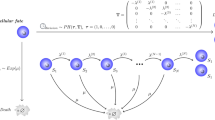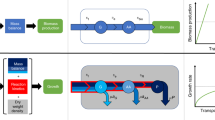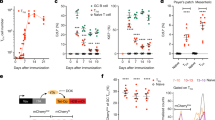Abstract
THE way in which mitogens stimulate lymphocytes to divide in culture is not known. Some mitogens (for example, bacterial lipopolysaccharides) stimulate immunoglobulin-bearing lymphocytes to divide and secrete antibodies; others, such as concavanalin A (con A) or phytohaemagglutinin (PHA), stimulate thymus-derived cells (T cells) to proliferate1,2. An analysis of the mechanism of action of these mitogens may be helpful in deciding how specific lymphocytes respond to antigen. We report here a case of genetic control of the ability of leukocytes to respond to a T-cell mitogen; lymphocytes from certain inbred chicken lines give a high proliferative response to con A, whereas those of other lines give a low response. The chicken provides a suitable model for studying such responses, in particular because it is easy to culture avian peripheral blood leukocytes and thus compare the results of mitogen stimulation directly with those obtained using human peripheral blood cells.
This is a preview of subscription content, access via your institution
Access options
Subscribe to this journal
Receive 51 print issues and online access
$199.00 per year
only $3.90 per issue
Buy this article
- Purchase on Springer Link
- Instant access to full article PDF
Prices may be subject to local taxes which are calculated during checkout
Similar content being viewed by others
References
Moller, G., (ed.), Transplant. Rev., 11 (1972).
Weber, W. T., Transplant. Rev., 24, 113 (1975).
Hasek, M., Knízetová, F., and Mervartová, H., Folia biol., 12, 335 (1966).
Hála, K., Hašek, M., Hlozánek, I., Hort, J., Knízetová, F., and Mérvartová, H., Folia biol., 12, 407 (1966).
Greaves, M. F., Roitt, I. M., and Rose, M. E., Nature, 220, 293 (1968).
Miggiano, V., Birgen, I., and Pink, J. R. L., Eur. J. Immunol., 4, 397 (1974).
Schierman, L. W., and McBride, R. A., Transplantation, 8, 515 (1969).
Hála, K., Vilhelmová, M., and Hartmanová, J., Immunogenetics, 3, 97 (1976).
Ziegler, A., and Pink, J. R. L., J. biol. Chem. (in the press).
Ivanyi, J., Immunogenetics, 2, 69 (1975).
Pink, J. R. L., and Ivanyi, J., Eur. J. Immun., 5, 506 (1975).
McIndoe, W. M., Nature, 195, 353 (1962).
Hutt, F. B., in Pigment Cell Growth (edit. by Gordon, M.), 29 (Academic, London, 1953).
Gilmour, D. G., in Physiology and Biochemistry of the Domestic Fowl, 2 (edit. by Bell, D. J., and Freeman, B. M.), 883 (Academic, London, 1971).
Watson, J., and Riblet, R., J. exp. Med., 140, 1147 (1974).
William, M., and Benacerraf, B., J. exp. Med., 135, 1279 (1972).
Newlin, C. M., and Gasser, D. L., J. Immun., 110, 622 (1973).
Author information
Authors and Affiliations
Rights and permissions
About this article
Cite this article
MIGGIANO, V., NORTH, M., BUDER, A. et al. Genetic control of the response of chicken leukocytes to a T-cell mitogen. Nature 263, 61–63 (1976). https://doi.org/10.1038/263061a0
Received:
Accepted:
Issue Date:
DOI: https://doi.org/10.1038/263061a0
This article is cited by
-
Genetic control of T-lymphocyte mitogenesis in chickens
Immunogenetics (1981)
Comments
By submitting a comment you agree to abide by our Terms and Community Guidelines. If you find something abusive or that does not comply with our terms or guidelines please flag it as inappropriate.



